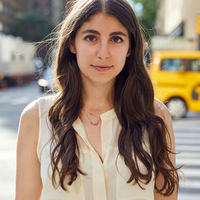In 'Zurawski v. Texas,' the Post-Dobbs Reality Is Darker Than You Could Have Imagined
A new documentary, executive produced by Hillary and Chelsea Clinton, and Jennifer Lawrence, shows just how catastrophic anti-abortion bills are for women and families—and what’s at stake if we stop fighting them.
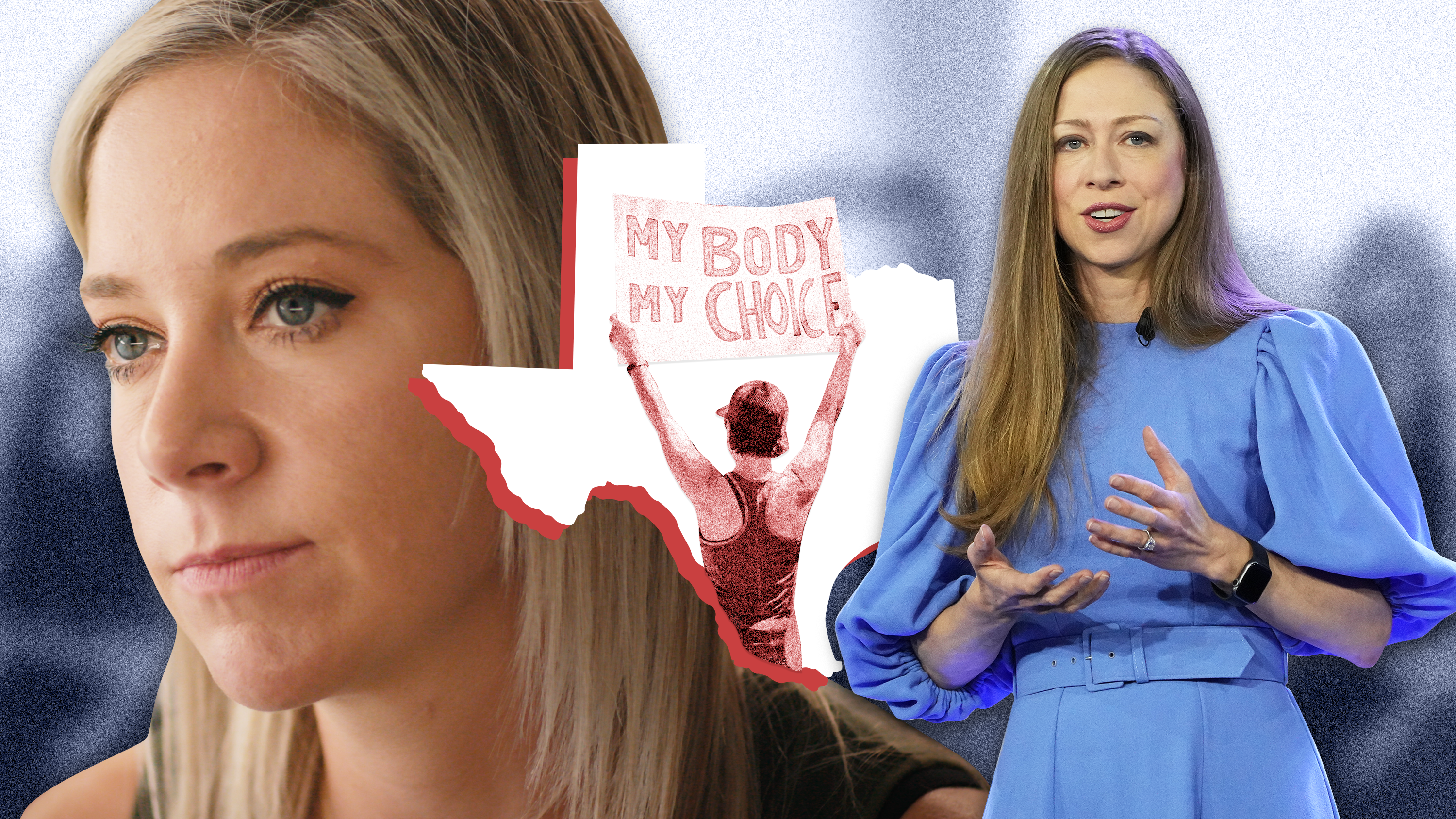
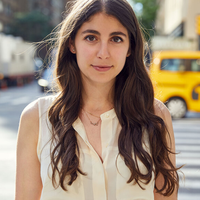
In August 2022, Amanda Zurawski, who was pregnant with a baby girl after months of fertility treatments, learned her water had broken prematurely at 18 weeks. Her pregnancy was no longer viable. Abortion was the standard treatment of care, but because the Supreme Court had overturned Roe v. Wade less than two months prior in June 2022, Texas, where Zurawski lives, had banned abortion except in cases where the procedure is necessary to save the patient’s life. (The law contains language that critics argue is incredibly vague.) So Zurawski, then 35, wasn’t able to receive an abortion until she went into septic shock and was therefore in danger of losing her life; that was three days after she learned her baby would not survive.
After the harrowing experience of losing her baby, a girl she named Willow, and nearly losing her own life, Zurawski also learned that she may never be able to get pregnant again. If she had been able to receive an abortion earlier, her fertility might not have been compromised.
In March 2023, Zurawski joined forces with the Center for Reproductive Rights and four other plaintiffs to sue the state of Texas and urge the state to clarify the conditions in which an abortion can be provided legally. Zurawski v. Texas was the first case brought on behalf of women denied abortions since the fall of Roe.
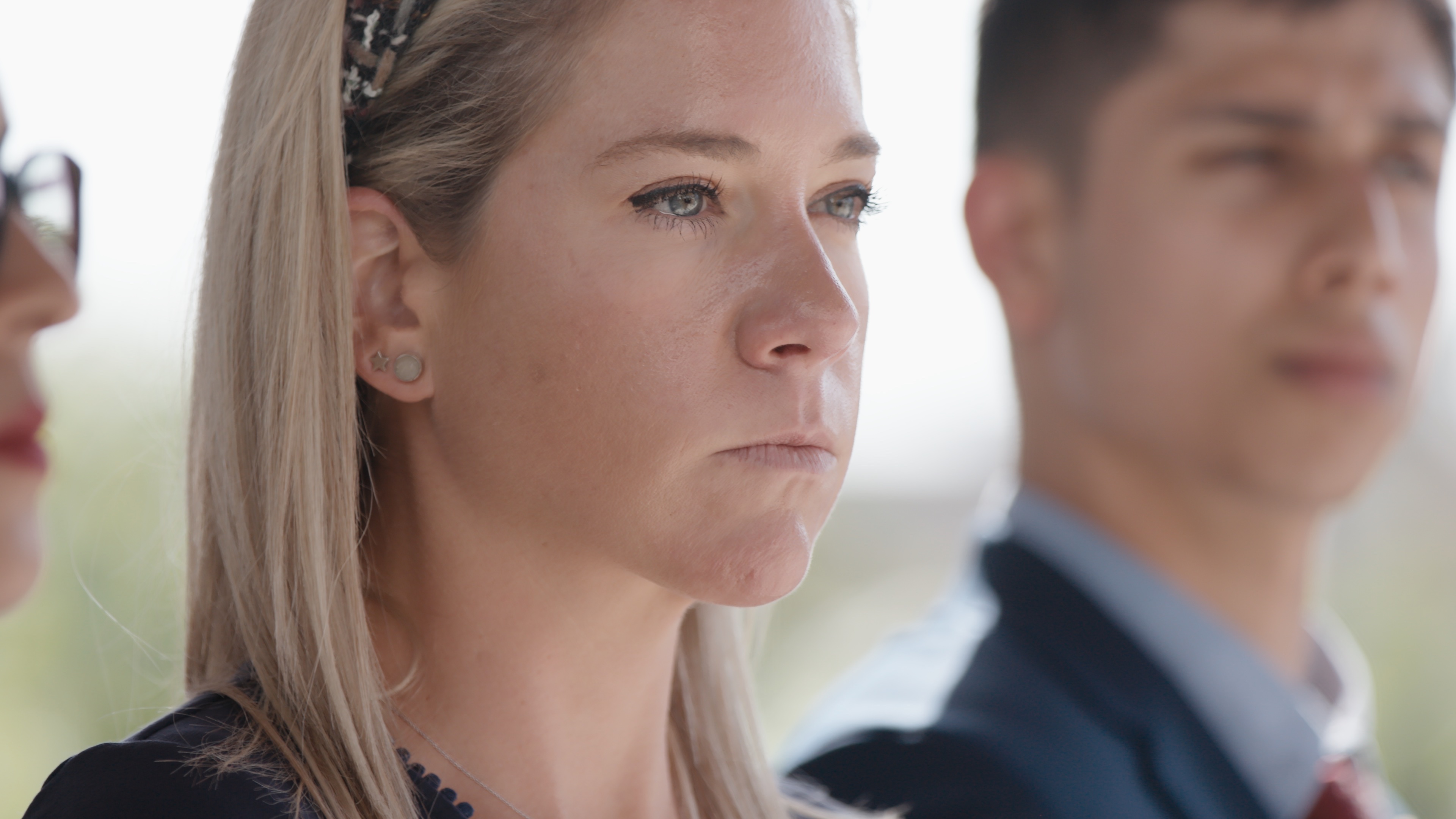
Amanda Zurawski watches a press conference featured in the documentary Zurawski v Texas.
Since they filed the case, the plaintiffs now total 22, 20 of whom were denied abortion care. Among them are Samantha Casiano, who was forced to carry a fetus who had no chance of survival, and Dr. Austin Dennard, an OB/GYN who learned her fetus had no chance of survival and left the state to terminate the pregnancy when her doctors said they could not perform an abortion due to the state’s laws.
Zurawski has told her story dozens of times since they first filed the lawsuit—on the stage at the 2024 Democratic National Convention, to newspapers and magazines, and in advertisements for pro-choice candidates. Now, she, Casiano, and Dennard are at the center of the urgent documentary Zurawski v. Texas, which chronicles the case led by the indefatigable lawyer Molly Duane.
Directed by Maisie Crow and Abbie Perrault, and executive produced by Hillary and Chelsea Clinton, as well as Oscar-winner Jennifer Lawrence, with support from Bumble Inc., Zurawski v. Texas tells the story of what really happens when draconian post-Dobbs anti-abortion laws are enacted.
Ahead, Zurawski, now 37, and Chelsea Clinton share what they hope the film—which is available to stream for free through the election— teaches people about abortion care, the type of resilience and camaraderie that can be found in the darkest of times, and what’s at stake when abortion is on the ballot.
Get exclusive access to fashion and beauty trends, hot-off-the-press celebrity news, and more.
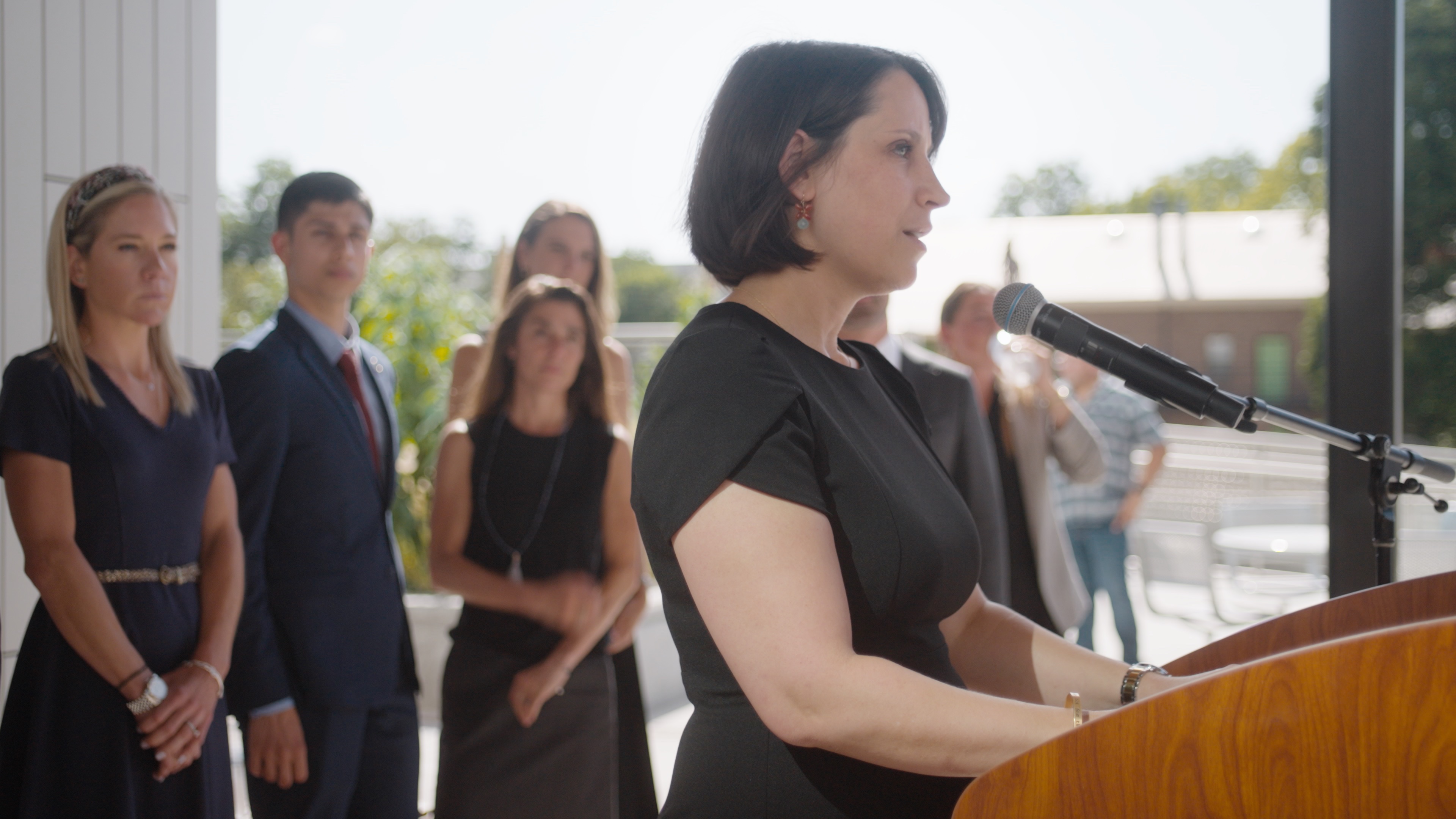
Attorney Molly Duane of the Center for Reproductive Rights speaking at a press conference.
Marie Claire: Amanda, how did this documentary come about? What was your first reaction to Maisie and Abbie saying, "We want to film this time in your life?"
Amanda Zurawski: The filmmakers actually worked with The Center for Reproductive Rights in 2016 on a movie called Jackson. I had already been working with the Center for several months preparing for filing the lawsuit, and then days before we filed, my team said, "Hey, there are these filmmakers that are interested in making a documentary.” They explained to me how much trust they had in them and the partnership that they had built before. I had built such a partnership and a relationship with the Center at that point that when they said, "We trust that this will be a compassionate, and compelling, and educational project," it did not take much convincing for me.
I then had a Zoom call with Maisie and Abbie just to get to know them and understand what they wanted to do. Right away, we were like, "Yes, this is a partnership that we trust, and they're clearly coming at it from the right perspective." It was a big of a leap of faith, but I think it was the right decision.
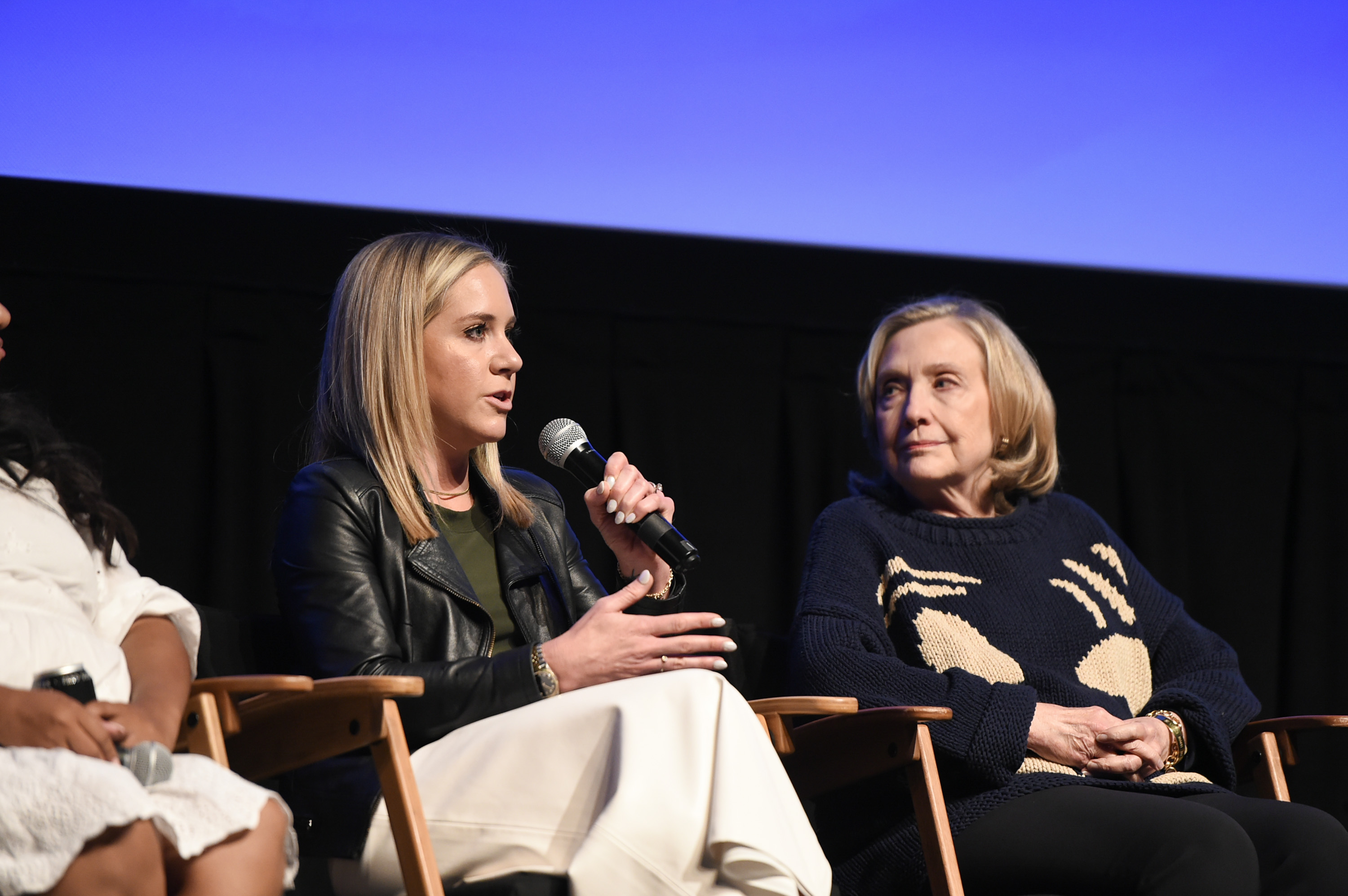
Zurwaski and Hillary Clinton speak at a screening for the documentary.
MC: Chelsea, what about this specific case made you and your mother want to get involved as producers?
Chelsea Clinton: When the draft of the Dobbs decision leaked—which was not surprising and yet still wrenching—in early May, my mom and I immediately started a conversation. Well, we didn't really start. We continued a conversation that we've been having for years: What can we do, in this moment, to use our platform to support every part of the ecosystem that we need now?
We wanted to support patients, providers, the patients and the providers who will become the plaintiffs, and the lawyers. And also we wanted to engage narratively to help more people understand that the picture of abortion in this country, that is often not only articulated but shouted by those who oppose abortion rights, actually has no remote semblance of what abortion looks like in this country.
We spoke to our partners at Hidden Light, our production team, to say, "We want to talk to anyone and everyone who is working on stories that will inform Americans about the catastrophic consequences that we know these bans will bring to real women's lives, to families' lives, to communities' lives."
Amanda's the first lead plaintiff in more than 50 years [to sue for abortion access]. We thought that her story and the story of her fellow plaintiffs was just so powerful, urgent, and necessary, and we have been honored to be part of this project.
We wanted to engage narratively to help more people understand that the picture of abortion in this country, that is often not only articulated but shouted by those who oppose abortion rights, actually has no remote semblance of what abortion looks like in this country.
Chelsea Clinton
MC: There were so many moments of camaraderie among the plaintiffs in this film. Amanda, there's a moment where you meet Samantha in her car, and you're just so warm. You can tell that that meant so much to her. There's another moment where Molly is telling you about Kate Cox [a woman who filed a temporary restraining order to receive an emergency abortion in the state of Texas and was denied]. The first thing you said was, "Give her my number." I'm curious what the experience was like of meeting all of these other women who had been through something similar to what you had been through. What kind of community have you built?
AZ: We are unfortunately part of this unique club that none of us want to be a part of. But once you're part of it, you realize that the folks in it are very special. That's anyone who's been through loss and denial of care, and then you add the additional layer of filing this lawsuit together.
At first, I will be honest, I think we all kind of kept our distance, because we were quite nervous. Being plaintiffs, we knew text messages can be subpoenaed, emails can be subpoenaed. We were just a little nervous on how and when and whether we could communicate. We also were, and still are, on very different paths in our family-building journeys. Some were and still have experienced additional loss, some have had babies, some have, in Samantha's case, gotten their reproductive organs removed. We are just in all of these different places, and so we didn't know in the beginning how to really build a bridge.
Fast-forward a year and a half, and I've got text threads, email threads, we're all getting together next Friday. We have Halloween parties, we have Christmas parties, so we have really built this very special and unique bond. Having that support system really is huge in the healing piece of all of this, because knowing that you're not alone, and knowing that there are others who see you, they understand you, they're there for you, it really goes a long way.
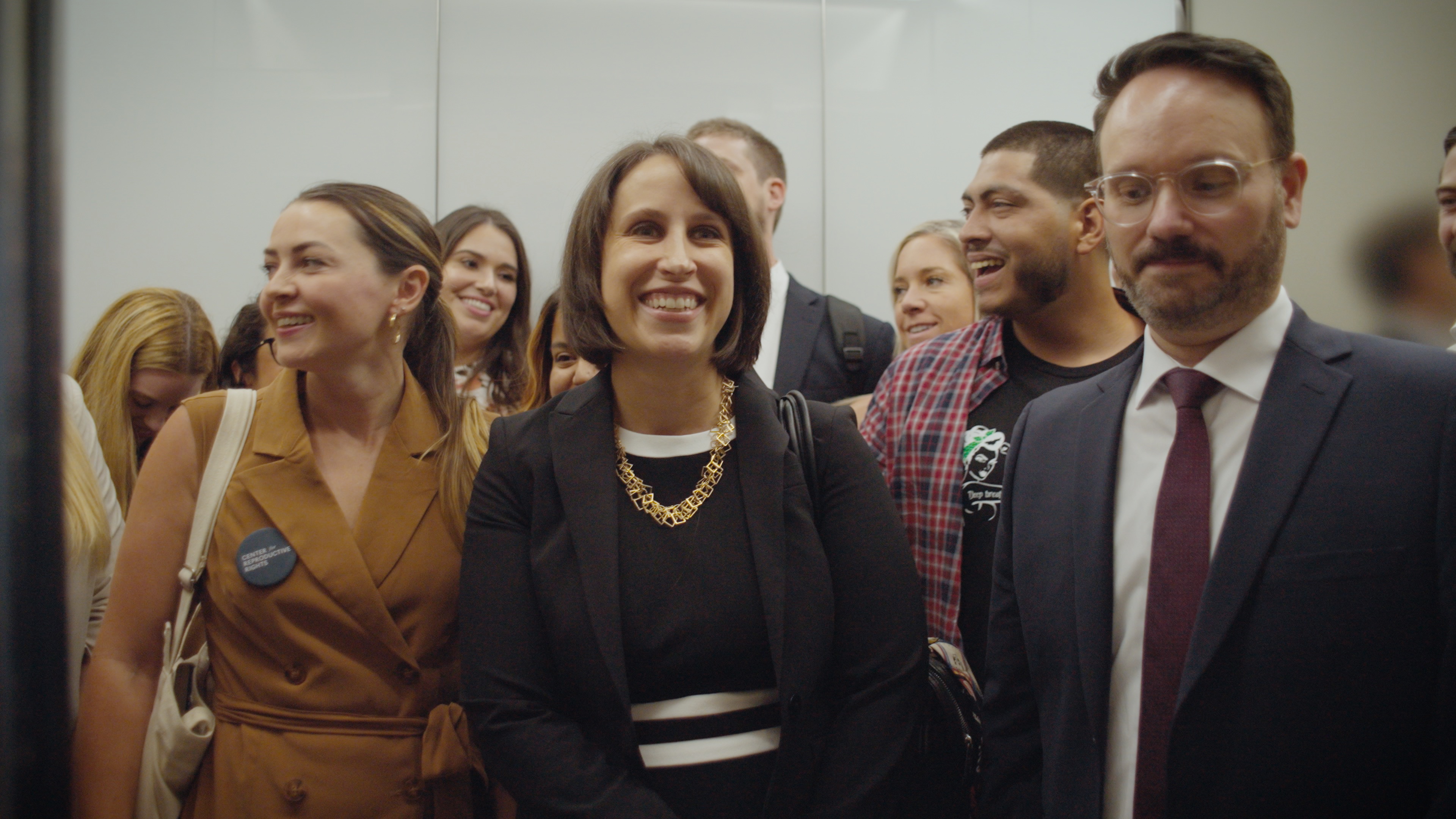
The plaintiffs and members of the Center for Reproductive Rights following a hearing at Travis County Civil Family Court.
MC: You do so many interviews, you've been to the State of the Union, you were on the DNC stage, your name and your story are out there. So many of your plaintiffs have similar situations where they're telling their stories publicly. How are you dealing with having to continually put yourself out there?
AZ: I don't think there were any of us that had any sort of aspirations to live this loud, political life. Now, many of us are leaning in because we feel like we don't have a choice but to fight back. If this is the way that we can fight back, we're going to take the opportunity.
For me, it's been quite healing and quite empowering to be able to use this horrible thing that happened to me—this sadness and this grief—and turn it into action.
If nothing else, we have already seen the tides turn. We have seen positivity, just in the fact that people across the country are talking about this and they're talking about it differently. People are using the word abortion. We're talking about IVF. That to me is very encouraging.
Also, on a very personal level, the more you talk about the thing that happened to you, the less control it has over you. Now, would I have chosen to process this grief on a national stage? Probably not, but that's the hand that life dealt me. I feel very empowered to tell my story, which is really the story of so many folks in this country, and hopefully give the confidence to others to speak up and share their stories as well.
I don't think there were any of us that had any sort of aspirations to live this loud, political life. Now, many of us are leaning in because we feel like we don't have a choice but to fight back. If this is the way that we can fight back, we're going to take the opportunity.
Amanda Zurawski
MC: Chelsea, what do you think a documentary like this has the power to do?
CC: One of the things that has been incredibly powerful for me to hear from Amanda, Samantha, and Austin—the three women who, as I always say, are American heroes who we never should have been asked to be heroes—is that every time they speak out, whether at a panel after the film, or in interviews, or certainly when Amanda spoke at the DNC, they always hear from at least one other patient who has said, "Thank you for giving me the courage to now talk to my family, to talk to my community."
On a public level, we certainly hope to change hearts and minds through just informing people around what abortion is, and that it is healthcare. And that it's not ethically or morally an entanglement for anyone to think that what happened to Amanda is just unconscionable and unacceptable and should be illegal. If anything, we need to invert the argument. We've seen in places where people have been able to vote directly on abortion since the fall of Roe and the Dobbs decision—in historically blue, red, and purple states—people have voted fairly overwhelmingly in favor of enabling women to access the healthcare that we need; enabling us to have the freedom of choice over our bodies, and our reproductive lives, and how we choose to expand our families.
Sometimes people in conversations like this think, "Well, we just have to change people's hearts, because everyone knows what abortion is in our country. Everyone knows that the vast majority of abortions happen in the first 10 weeks, and the overwhelming majority of those that happen between 10 and 20 weeks are medically necessary.”
But what we found through this film is that everyone doesn't know that. A lot of people who've had miscarriages and received care for their miscarriage management didn't realize that what they then had was an abortion.
We are educating people that abortion is healthcare and the medical reasons why some women would choose to terminate a pregnancy.
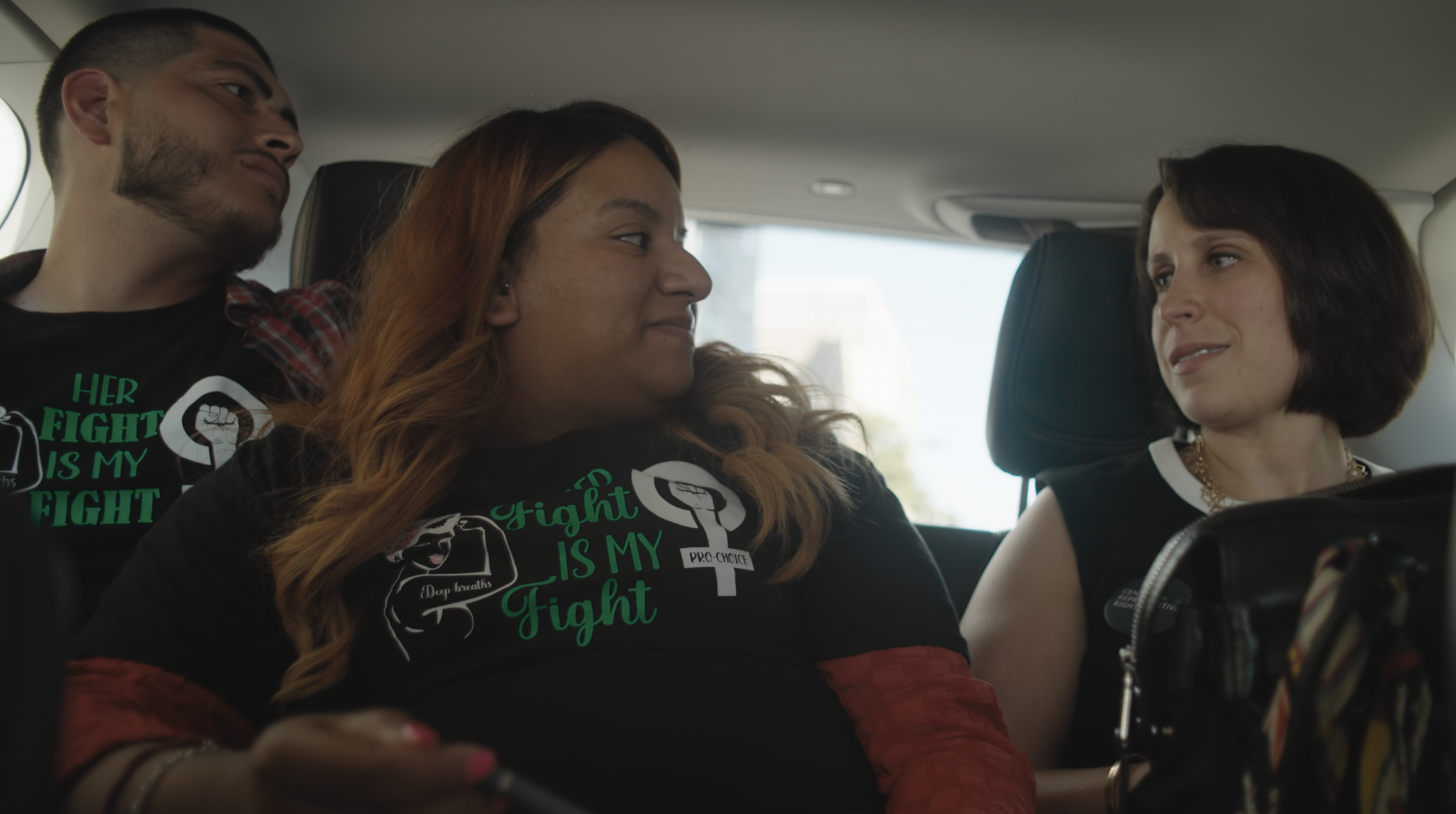
Luis Villasana, Samantha Casiano, and Molly Dunne moments after Samantha took the stand at Travis County Civil Family Court.
MC: There are some strong male allies in the story, like Amanda, your husband Josh. Abortion affects their lives too. What is your message to men and non-birthing people about why abortion access affects them?
AZ: The male voice is crucial in this work. For a while, we didn't see a lot of men standing up, because they felt that this was not their business. This was a woman's decision, a woman's issue, and it really seems like they needed some sort of permission structure to start speaking out regardless of how they felt.
Men are seeing other men speak up. When you talk to them, they're seeing how this impacts men. It impacts their wives, their sisters, their moms, their aunts, and they care very deeply about that. Then they take a step back and they realize, Okay, when it impacts my family, that impacts me. Now, suddenly, this isn't a women's issue, this is a family issue. This is a basic human rights issue.
I say this all the time: I have yet to have someone say to me, "Oh, yeah, what's going on in Texas, what happened to you is perfectly reasonable. This should be happening." It's just connecting the dots for them. And then with men, specifically, giving them that permission structure to speak out and to be not just an ally but an advocate. I think especially as we get closer and closer to the election, and we see more men standing up, it's this domino effect.
Some of the toughest work, but also the most important work, is happening where we don't see it. It's happening in people's living rooms during Sunday night football. It's happening at the gym, it's happening on the basketball court. Men are having these conversations. They might be doing it in their own community where we don't hear about it on a national stage, but I think that's the most important conversation you can be having. Because when you hear it from someone you know directly, that's really going to start moving the needle.
We are educating people that abortion is healthcare and the medical reasons why some women would choose to terminate a pregnancy.
Chelsea Clinton
MC: We even see it within your own family. Your mom says, "This is now a single issue election for me." What is your message to people who aren't already paying attention to the fight for abortion access?
AZ: These are basic human rights that are being taken away from us. In my lifetime, I have never seen a right that I have be taken away. Certainly, I've seen the fight to gain rights, but I haven't seen something that was already guaranteed to me stripped away. If you think they're going to stop with reproductive care, you need to wake up.
As long as we are allowing people to be in a position of political power who are willing to take our fundamental freedoms away from us, we are not free as a country. We are not a democracy. If you care about your freedoms, and if you care about this country, you need to take action and you need to vote accordingly.
CC: Think about Amanda's call to all of us when you're voting, not just for the presidential election, but in every election, and in this election at every stage of the ballot. Abortion's on the ballot in 10 states. Three of the judges that you see in the documentary, who show no compassion or empathy for Amanda, nor, I would argue, a fundamental understanding of the US Constitution, or our other founding documents… they're up for reelection in just a handful of days. [Ed note: Constituents in Arizona, Florida, Missouri, Montana, South Dakota, Nevada, Colorado, Maryland, and New York will have the ability to vote on proposals and propositions regarding abortion access this year. The Texas judges who sided with the state in Zurawski v. Texas and are up for reelection are Justice Jimmy Blacklock, Justice Jane Bland, Justice John Devine.]
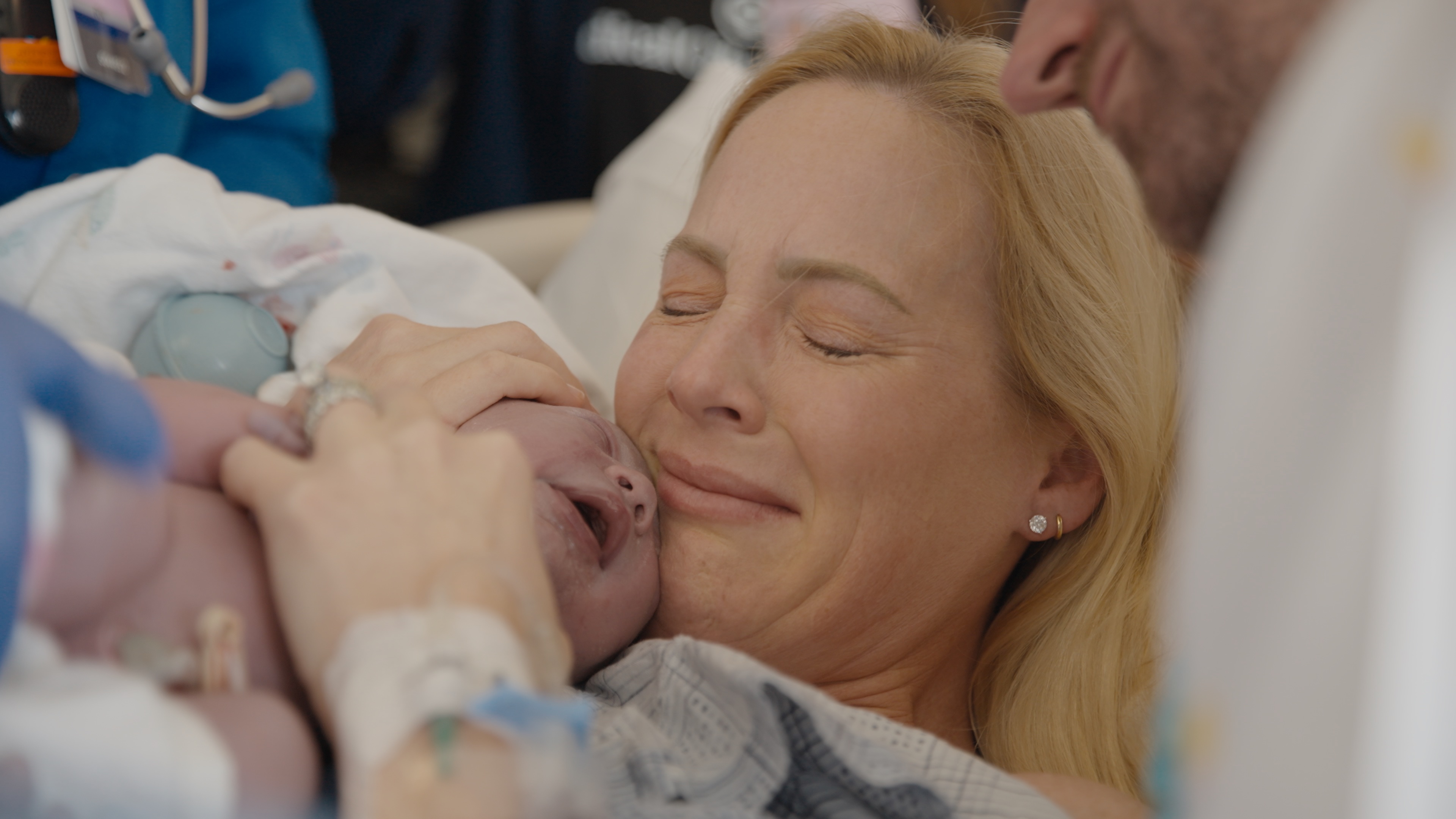
Dr. Austin Dennard holds her newborn son after giving birth in a moment featured in the documentary.
MC: On Tuesday, if Trump wins the presidency, many fear he will enact a federal abortion ban [though he has said he would veto a ban and supports states’ right to set laws on abortion access]. How can people who care about these issues keep fighting and working against an oppositional federal government?
AZ: I think that's a really important question, because I think a lot of people don't realize that regardless of what happens Tuesday at the top of the ticket, with all of these ballot measures, there will still be a fight. I'm very hopeful that [this] week, we'll have a day of celebration, but then we also must remain vigilant.
The way that they're trying to take away our rights is terrifying, and they're taking all of these back roads to do it. That's how we got here in the first place. We know that the anti-choice movement is calculated, they are smart, and they're organized, and they're relentless, and we need to be all of those things, but more so.
CC: That's Amanda's reality right now in Texas. How could I choose to be anything but urgently engaged and optimistic that we can have a different future for all of us, and especially [for] the more than one-third of American women who are reproductive age, living under very strict abortion bans?
Amanda's getting up every day and doing what she can do. How could any of the rest of us feel anything but an obligation to do the same? There still will be so much work to do for women and families on Wednesday.
This interview has been edited and condensed for clarity.
Jessica Goodman is the New York Times bestselling author of The Counselors, They'll Never Catch Us, and They Wish They Were Us. She is the former op-ed editor at Cosmopolitan magazine, and was part of the 2017 team that won a National Magazine Award in personal service. She has also held editorial positions at Entertainment Weekly and HuffPost, and her work has been published in outlets like Glamour, Condé Nast Traveler, Elle, and Marie Claire.
